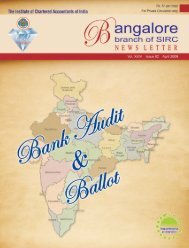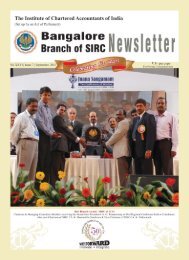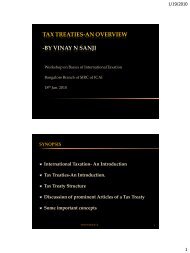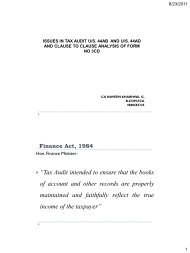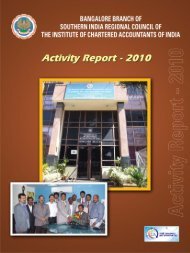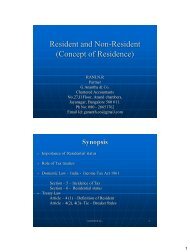Blore Br_Sept_09_Newsletter_email.pmd - Bangalore Branch of SIRC
Blore Br_Sept_09_Newsletter_email.pmd - Bangalore Branch of SIRC
Blore Br_Sept_09_Newsletter_email.pmd - Bangalore Branch of SIRC
- No tags were found...
Create successful ePaper yourself
Turn your PDF publications into a flip-book with our unique Google optimized e-Paper software.
Think Differently Act PerfectlyService Tax – Series – Part IILevy, Extent and CollectionCA Rajesh Kumar T R, B Com, LLB, FCA & DISA & CA Chandra Shekar B D, B Com. LLB, FCA, DISALevyAs per section 65(95) <strong>of</strong> Finance Act, 1994, service taxmeans tax leviable under the provisions <strong>of</strong> Chapter V <strong>of</strong>Finance Act 1994. The levy <strong>of</strong> service tax is invoked by thecharging section 66 <strong>of</strong> the Finance Act, 1994.According to the charging section the service tax shall belevied at the rate <strong>of</strong> 12% <strong>of</strong> the value <strong>of</strong> taxable servicesreferred in sub-clauses <strong>of</strong> Sec. 65(105). As per the chargingsection the activity should be covered under any <strong>of</strong> the subclauses<strong>of</strong> Sec. 65(105).The said charging section does not give the nature <strong>of</strong> servicetax. As to the nature <strong>of</strong> service tax, CBE&C Circular No. 56/5/2003 dated 25-4-2003 says that the service tax is a destinationbased consumption tax. Further Supreme Court in the case <strong>of</strong>All India Fedn. <strong>of</strong> Tax Practitioners vs UOI 2007 (7) STR 0625(S.C.) also says that service tax is a value added tax on thecommercial activity and is destination based consumption tax;it is not a charge on the business or consumer.Extent and ApplicationThe provisions <strong>of</strong> Chapter V <strong>of</strong> the Finance Act, 1994 isapplicable to taxable services provided after 1 st <strong>of</strong> July 1994.It extended to the whole <strong>of</strong> India except the State <strong>of</strong> Jammu& Kashmir. The above mentioned Supreme Court decisionalso says that Service tax is leviable only on services providedwithin the country.From this it can be understood that all services provided inthe state <strong>of</strong> Jammu & Kashmir are not covered for the purpose<strong>of</strong> Service Tax. However a clarification <strong>of</strong> Delhi Commissioneratehas clarified that if the service provider and service receiver areboth outside Jammu & Kashmir, though the services are providedwithin Jammu & Kashmir would be taxable.Further as per the clarification issued by the DirectorGeneral <strong>of</strong> Service Tax vide its letter F. No. V/DGST/03/GEN/INS/01/2004, dated 17-8-2004, since service tax is consumptionbased destination tax, if the service receiver is in Jammu &Kashmir, it is not taxable and if it service provider is outsideJammu & Kashmir though the service provider is in Jammu &Kashmir, it would be taxable.Taxable Event in Service TaxSection 66 is the charging section reads as ‘there shall belevied a tax(herein referred to as service tax) at the rate <strong>of</strong> 10percent <strong>of</strong> the value <strong>of</strong> taxable service as referred to in subclauses (a), (b), ……..… <strong>of</strong> clause 105 <strong>of</strong> section 65 andcollected as may be prescribed.’ But it is relevant to note thatthe taxable event is not brought out in the charging section.The confusion exists as to point <strong>of</strong> taxable event, sincethere are two points which are set out the definition, firstlythe event <strong>of</strong> providing service and secondly the event <strong>of</strong>agreeing to provide the service. Added to this the service taxis payable on receipt <strong>of</strong> consideration, which event may bedifferent from the events mentioned above. The confusion asto the taxable event would lead to the problems in determiningtax liability at the time <strong>of</strong> introduction <strong>of</strong> new category <strong>of</strong>services or change in tax rates.However in the Finance Act, 20<strong>09</strong> powers are given t<strong>of</strong>ormulate rules to determine the date for determination <strong>of</strong>rate <strong>of</strong> service tax. It is expected that the new rules wouldresolve some <strong>of</strong> the confusions existing as to determination <strong>of</strong>rate <strong>of</strong> service tax.Taxable ServiceThe essential aspect <strong>of</strong> levy would be the definition givenfor taxable services under Section 65(105) <strong>of</strong> the Finance Act,1994, as the taxability is on various sub-clauses <strong>of</strong> the said section65(105). In the said sub-clauses read with clause 105 <strong>of</strong> Section65, each sub-clause defines each type <strong>of</strong> taxable services. Thistype is commonly termed as ‘category’ <strong>of</strong> ‘taxable service.’The definition set out each sub-clause for each category<strong>of</strong> services is different from other and is mutually exclusive. e.g.as per section 65(105)(a), any service provided by stock brokerto any person in connection with sale or purchase <strong>of</strong> securitieslisted on a recognised stock exchange will be ‘taxable service’.Each <strong>of</strong> the sub-clauses specifies in most <strong>of</strong> the cases whoshould be the service provider, who should be the servicereceiver and what should be the nature <strong>of</strong> service. So in orderto understand the scope <strong>of</strong> definition <strong>of</strong> taxable servicesdepending upon the sub-clauses being examined, the meaningassigned therein for each <strong>of</strong> those elements, i.e. serviceprovider, service receiver or nature <strong>of</strong> services one has toexamine and understand the meanings set out in Chapter V<strong>of</strong> the Finance Act, 1994. If it is not so available, reference hasto be made to Central Excise Act, 1944. Even there it is notavailable, then reference has to be made to the commonparlance than to dictionary meanings and technical meanings.Service provider & service receiverService provider is a person who renders the service and servicereceiver is the person who takes the services <strong>of</strong> a service provider.There must be two persons involved in a particular servicetransaction. It is a generally accepted principal that ‘One cannotgive service to himself.’ This view has been upheld by the courts,in the case <strong>of</strong> Cawnpore Club Ltd Vs. CIT (1983) 183 ITR 620.Deemed service:The definition <strong>of</strong> taxable service starts with the phrase“taxable service” means any service provided or to beprovided,-”. That means firstly activity should be service. WhatAn empowered organization is one in which individuals have the knowledge, Skill, desire and opportunityto personally succeed in way that leads to collective organizational success – Stephen. R. Covey13<strong>Sept</strong>ember20<strong>09</strong>



